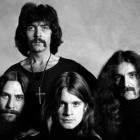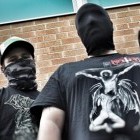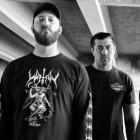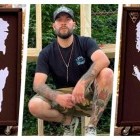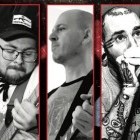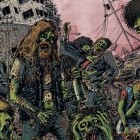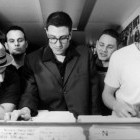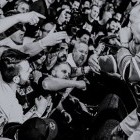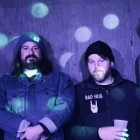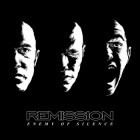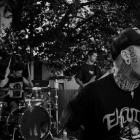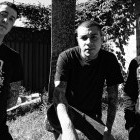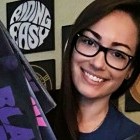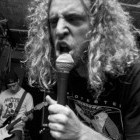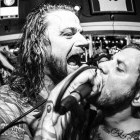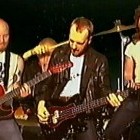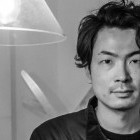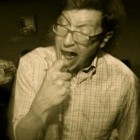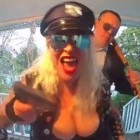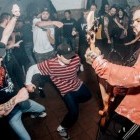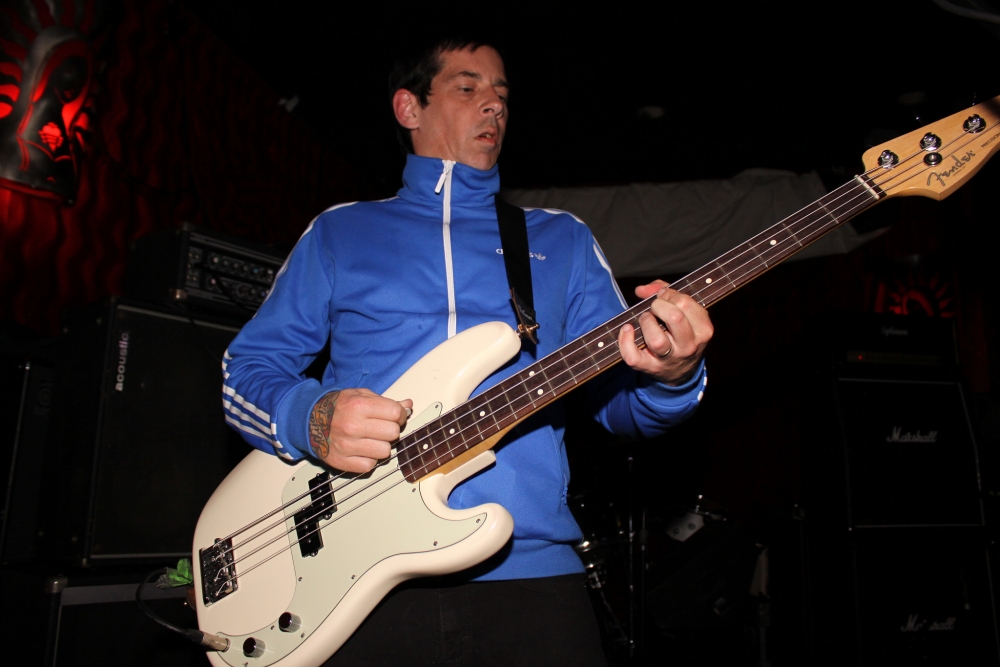
Back in 1989, when I was 14, me and my friends Rob Savage and Carlos Dengler were obsessed with the Murphy's Law album Back with a Bong. The guitarist on that record was Todd Youth, who was only four years older than I was, but had already been a staple of the NYHC scene. Before he was even high school age, Todd joined Agnostic Front, and after that, he helped form Warzone, playing on their seminal Lower East Side Crew E.P.
I've followed Todd's musical trajectory since then, and it's been a truly unique one. Since the '90s, he's played with such musical legends as Ace Frehley and Glen Campbell, and also been in bands like Bloodclot, Motörhead, and Chelsea Smiles. These days, he's playing bass in FireBurn, a melodic hardcore combo that I've been raving about on the site since they appeared from out of nowhere last year.
Earlier this month, I met up with Todd for dinner at his favorite restaurant in Los Angeles, Crossroads Kitchen. Below is the conversation we had about his life and musical career. It's a long interview, but I think many of you will enjoy the bits of trivia strewn throughout it.
Let's start with your upbringing and how you got into music. Were your parents liberal, all that kind of stuff. I just realized that I don't even know if you're a New York City native?
I was actually born and raised in New Jersey. Patterson, Wayne, Haledon, all around those areas. We moved around a bunch. I wouldn't say my parents were liberal, but let's go with neglectful [laughs]. My dad was too busy working. The fact that I would go once a month to get a comic book or a record was cool with him. Let's see... I got into music at a really young age. I'd say since I was about 5 or 6. I was obsessed with KISS. You know, I always say that my first show was the Bad Brains at CBGBs, but my first concert was KISS at Madison Square Garden in 1979 on the Dynasty tour. I was 8 at the time.
Wow! I was only 4 in 1979, so I didn't get to see KISS till years later. Who took you to the concert?
I had an older cousin who was your typical '70s burnout kid from Jersey. He was into Black Sabbath and Ted Nugent, and I even think some progressive shit like Emerson, Lake & Palmer. Anyway, when I was 5, he gave me two 8-track cassettes: [Ted Nugent's] Cat Scratch Fever and [Black Sabbath's] Master of Reality. So yeah, he was the one who hipped me to cool shit. But my dad used to take me to the record store and let me buy a record. Well, I would get my one record, and if there was any money left over, I would then go to the 99 cent cut-out bin and look for anything with a cool-looking cover and take a chance on it. During that same time, I would get this magazine called Rock Scene because it would have bands like KISS on the cover. Anyway, on the back of the magazine, they started having bands like the Ramones and Sex Pistols and these guys had these rad names like "Johnny Rotten" and "Sid Vicious," and they looked crazy! That was my introduction to punk rock.
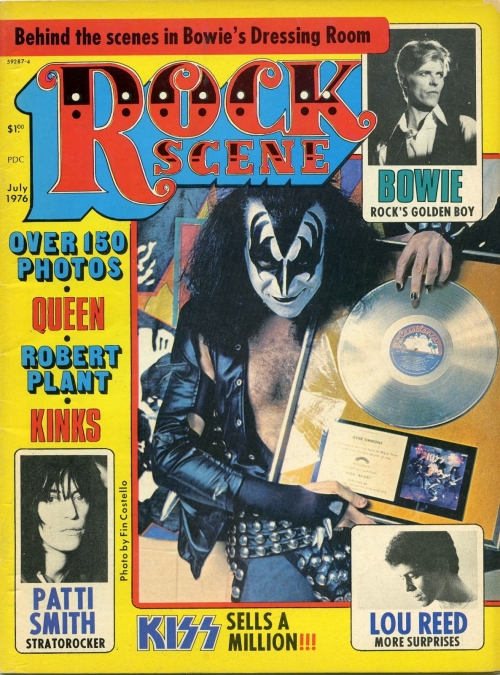
All roads lead back to KISS! What was your first punk record purchase?
There was an issue of Rock Scene that referred to Iggy Pop as the "Godfather of Punk," so on one of my record store trips with my dad, I found the TV Eye Live 1977 record for 99 cents and bought it. If you think about the lineup on that record with David Bowie on keyboards, Tony and Hunt Sales, Carlos Alomar—viscious band! I had this flip-top stereo and I put it on and the first song is "T.V. Eye," and in the middle of it, there's a breakdown and Iggy goes: "I got a T.V. and you got a T.V. We've all got T.V.s. Big fucking deal!" That was the first time I heard someone curse on a record!
I'm sure that's around the time you started hanging with other punks.
Yeah, I met some older kids who looked punk and I was like, "Whoa! You guys look like real punk rockers!" [Laughs] But then one of them says, "Nah, we're into hardcore." I had no idea what that meant. Then they say, "It's like punk rock but fast and extreme." I liked how that sounded. By that point I had already cut my hair and was trying to spike it [laughs]. You gotta remember, I was 10-years-old at the time.
SEE ALSO: Interview with Dave Smalley (DYS, Dag Nasty, ALL, Down by Law, Don’t Sleep)
You must have been excited to start looking into this whole "hardcore" business.
[Laughs] I don't know how I discovered it, but in the "Import" section of the record store, there was a 7" called Total Noise and it had The Business, Blitz, The Gonads, and Dead Generation on it. I bought it because it had a song called "Loud Proud & Punk" on it. From there, I just started buying anything that remotely looked like a hardcore record.
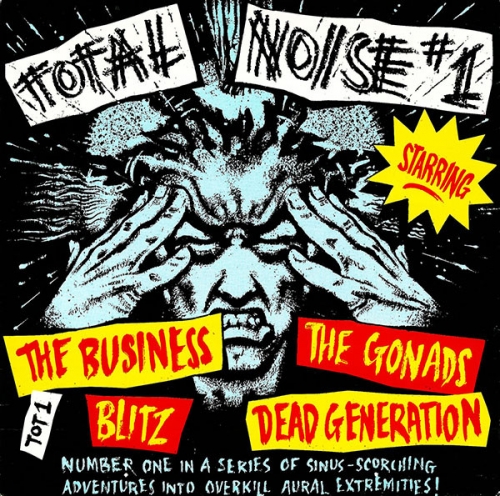
Many folks your age talk about the infamous Quincy "punk episode" as a big deal.
You kidding? Of course I saw that. How about the CHiPs punk episode? I still remember the song the band played! [Imitating the vocalist] "Pain! I dig pain!" [Laughs] The punk song in the Quincy episode was called "Next Stop, Nowhere." I remember all that shit. I have a ridiculous memory when it comes to music stuff. If I had to, I could probably still play the 1983 Agnostic Front set on bass to this day.
What was your first hardcore show?
That same cousin I was just telling you about would go see bands like The Plasmatics and Dead Boys play in the late '70s. It was like, "Did you hear? He went into The City! He's adventurous!" [Laughs] It was 20 minutes away but it was like such a big deal! Anyway, the day after Christmas 1982, my cousin took me to CBGBs to see SSD, Antidote, and Bad Brains. I was a fucked up kid with a fucked up family background, but when I walked into the club, I remember looking around and seeing a room full of people that looked as fucked up as I felt inside. I'll be honest, I don't remember SSD or Antidote's sets, but within the first 30 seconds of seeing the Bad Brains, my life has never been the same since. I get goosebumps just talking about it. I've talked to a lot of other people that also had their lives changed by seeing the Bad Brains.
Even though I was still a little kid, I started hanging out with them not long after that, and they had even more of an impact on me. I became a vegetarian. I started checking for spirituality. I probably wouldn't have had my two oldest daughters with my first wife, Kate [Halpern], if it weren't for [Bad Brains guitarist] Doc's [aka Dr. Know] influence. When I was in Murphy's Law, here was a guy [Dr. Know] that had three kids and still making the band happen. He said to me, "You have to plant your seed, man." I was 17 when I had my oldest daughter. Lisa, Doc's first wife, and my first wife, Kate, were close friends. So we were always together. We lived on the Lower East Side at the time, and Doc and Lisa still had their apartment on 10th St., but that's around the time they were moving up to Woodstock, so we would go up there a lot. Anyway, it runs thick with the Bad Brains guys.
Let's go backwards a bit. How did you go from seeing that first Bad Brains show at CBGBs to then becoming a part of the NYHC scene?
Not long after that show, I started going into the city on my own. It was like a $3 bus ride back then. The train was like 75 cents, you know what I mean? I would go see shows at A7 and Great Gildersleeves and hung out a lot. I would stay in NYC for the weekend a lot because there were so many shows going on. I would stay at Apartment X on Norfolk St. That was a punk rock crash pad where the Cause for Alarm guys stayed. [Agnostic Front singer] Roger [Miret] lived there. On a Friday night there would be like 10 people sleeping on the floor.
You mentioned Roger from Agnostic Front living there. Is that how you got into Agnostic Front?
I remember there was a bass in the apartment and I picked it up one day and started playing "N.I.B." from Black Sabbath. Roger was like, "Yo! You can really play!" You know, back then, nobody could really play, with the exception of the Brains. [Laughs] So for me to be able to play something like "N.I.B." on bass was impressive to Roger. They had recorded United Blood already, but it wasn't out yet. Their bass player was Adam Mucci and he was also playing in Murphy's Law at the same time. Well, I they gave him an ultimatum: either pick Agnostic Front or Murphy's Law. I think because they gave him the ultimatum, he was like, "Fuck you, I'm joining Murphy's Law!" [Laughs] So AF needed a bass player. Anyway, after Roger saw me playing bass, he asks me, "How old are you?" I was 12 at the time, but I go in the hardest voice possible, "I'm 16." [Laughs] What's crazy is that no one questioned it! Here I was, this little kid with a shaved head and a chain belt. Yeah, I joined Agnostic Front at 12-years-old.
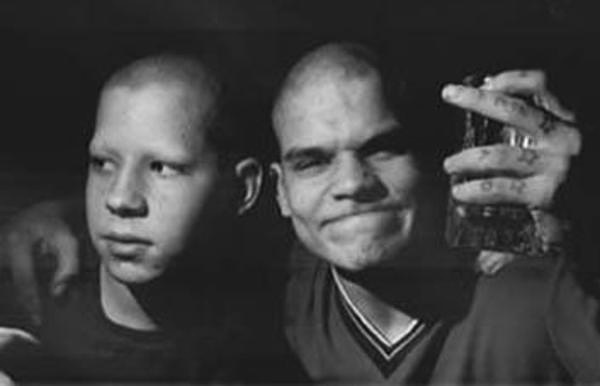
What ended up being your first show as a member of Agnostic Front?
It was a benefit Johnny Stiff threw at a place called the Squat Theatre that was somewhere in the 20s. Major Conflict might have played? I don't remember, but it was like one of those bills with 10 bands on it.
Were you still going back and forth between your parents' house in New Jersey and crashing in NYC?
I was pretty much living with [Agnostic Front guitarist] Vinnie Stigma at his apartment at that point. My parents would call up and Vinnie would say, "He's here and don't worry, I got him." [Laughs] But anyway, I wasn't even going to school at that point because I was in one of the biggest hardcore bands in the city, and the keys to the kingdom had opened up for me. Hanging at A7 all night, girls, and all that shit. That was pretty much my musical education because they used to have a reggae night there where these dreads would come in and jam and smoke herb. They would need people to jam with and I would always volunteer. That's the way I learned how to really play.
SEE ALSO: 12 Newer Hardcore Bands to Check Out in 2018
It's crazy to think how young you were yet still immersed in this downtown NYC scene.
My favorite memory is... well, you know the famous flyer for the Agnostic Front and Crucifix show at CBs? The one that says "Punks n Skins" on it? Well, I'm the one that drew the stitches on Vinnie's head because the first CBs show I played with AF, he had smashed his head open on one of those speakers that they hung from the ceiling. It happened during Death Before Dishonor's set, so Roger and I rushed him to the hospital. He's lying there in the emergency room with like 60 stitches in his head. We figured we would have to cancel, but Vinnie goes, "Nah, man! We can't cancel. You gotta do it for the kids!" [Laughs] So we played as a three piece. Me on bass, Dave Jones on drums, and Roger singing. But if I had to pick a highlight of my time in Agnostic Front, it would have to be that show with Crucifix.
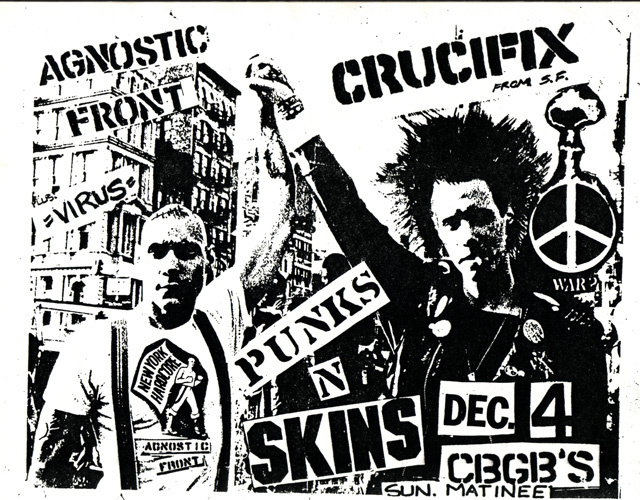
Why did you quit Agnostic Front? Victim In Pain wasn't even out yet!
By that point, I hadn't been in school for over a year, so my parents were getting sweated for neglect. The only way they could sort of flip that around was by saying I was an "incorrigible minor," which I was. The cops would always show up looking for me at the different apartments I would stay it. I would then go home and bail again anyway. So I had to quit Agnostic Front because my parents made me. I quit less than three months before they recorded Victim In Pain. That would have been my first record. But like Roger said in his book, I had a hand in writing in a lot of that stuff. That was really sweet of him. He didn't have to say that in his book.
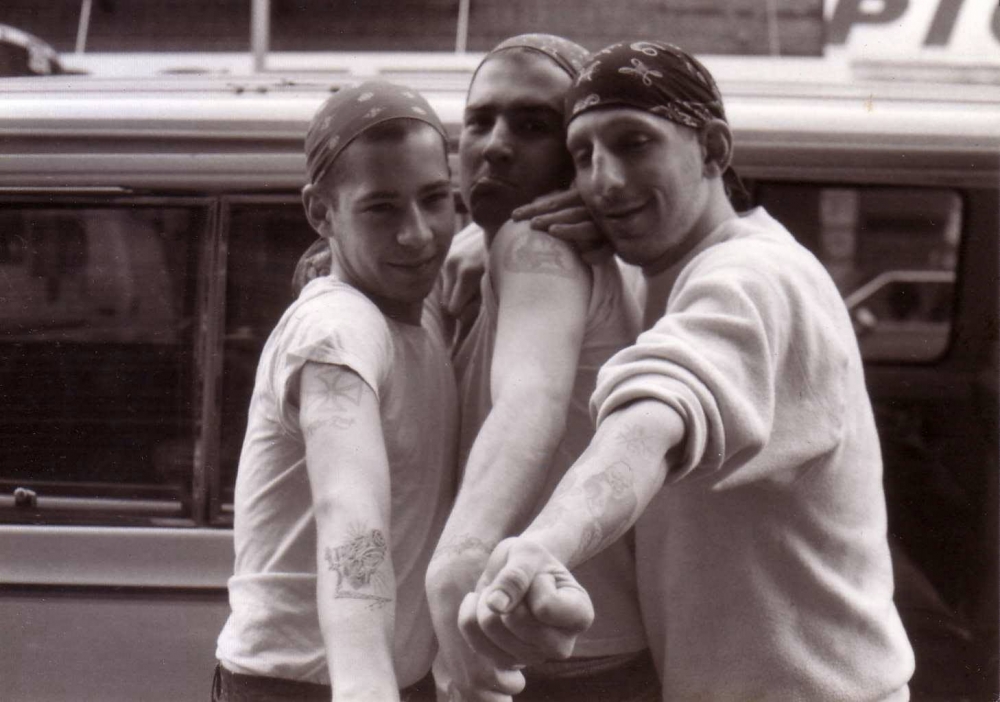
After Agnostic Front, you played in Warzone. How did that band get started?
Well, before that, Raybeez and I started a band called Skinhead Youth. He had played drums in Agnostic Front before that, but Roger told him that he should be a singer because he was a terrible drummer [laughs]. Skinhead Youth was the first band Ray sang in, and I played bass, Big Al from Cause for Alarm on guitar, and Billy Psycho on drums. You had these three scary-looking skinhead dudes and little 13-year-old me [laughs]. This was early 1984. I was the youngest, but I wrote all the shit. Some of the Skinhead Youth songs ended up becoming Warzone songs. Stuff like "Dance Hard or Die," "Skinhead Youth," Open Your Eyes," and a couple of others.
Did Skinhead Youth play out a lot?
We played one show opening up for Agnostic Front at CBs. I remember when we were sound-checking, I saw my dad come into the club with two police officers. I hadn't been home in weeks, so they were looking for me. I threw my bass down and ran out the back door of CBs, down the alley, down 3rd St., and into one of those basement staircases you see in the city. I hid there till I saw a pair of Doc Martens passing by and it was Ray. [Laughs] He gave me a ski mask and I went back into CBs and played the show like that. I think he introduced me to the crowd as "Larry," or something like that.
Why did Skinhead Youth break up?
I had gotten arrested and was sent away for a little while. I ended up in foster care, but I bailed on that after a while. I went back to the Lower East Side and Ray had already started Warzone. Oh wait, I just remembered. Somewhere in there, I played bass with Warzone and Ray played drums with Tommy Rat singing. Then Tommy quit and we made Ray the singer. I don't remember what year that was. But yeah, when I came back, Ray had Warzone going, for real. It was a given that I would play in the band. I moved to guitar because I was a better player than [original Warzone bassist] Tito was. Tito then switched to bass.
Was Warzone popular right away?
No way. People thought that we were a joke. We were terrible in the beginning. I listen to the Lower East Side Crew E.P. and I'm just like, [makes a disgusted look] "Man..." But we started to get better and it was a transitional period for hardcore. AF had put out Cause for Alarm, which was crossover. I was bummed when that record came out. When I see them now, and they play "The Eliminator," I'm like, "Yeah!" [Laughs] But there were many divided lines back then, and I was all about hardcore. I didn't like metal. I remember [Kraut, Cro-Mags guitarist] Doug Holland was living with [The Big Takeover zine editor, Even Worse drummer] Jack Rabid on Eldridge St. and Metallica's Kill 'Em All had just come out. He played it for me and I thought it was pretty dope till I saw the photo of them and was like, "These guys have long hair? Fuck them trying to rip off Discharge!" [Laughs] But then he put on Voivod's War and Pain and to this day I think that record is brilliant. I don't care how long their hair was!
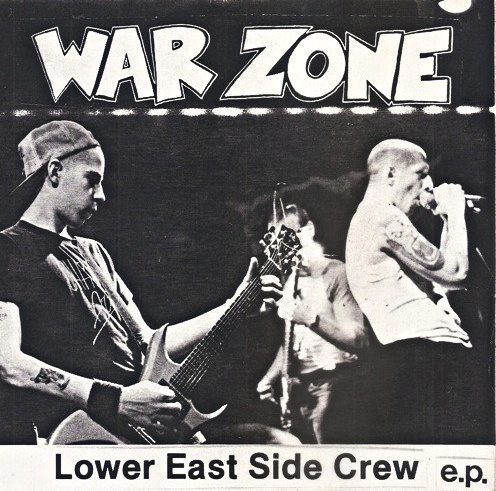
You bring up that period as being a transitional one for hardcore. That was when the second wave of NYHC bands came into the picture.
I remember walking into Free Being on 2nd Ave. and seeing a 7" on the wall that had a dude with a shaved head on the cover. I bought it because that was me. I looked like that. It was a Youth of Today record. I was living with Raybeez at the time on Ludlow St. and I had this shitty record player. Anyway, I put the record on and it blew me away. Then I read the liner notes and I see "Ray Cappo" in there and was shocked. I remembered Ray from when he was in Violent Children. That newer hardcore appealed to me. Bands like Straight Ahead, Youth of Today, Rest In Pieces... all that stuff. I felt way more connected to those bands than the crossover thing that was happening. "This is the hardcore I like." I know people that were a little older were dimissive of that stuff, but I was the same age as those newer bands. Actually, I was a little younger than they were. But that's what kept hardcore going. Those newer bands.
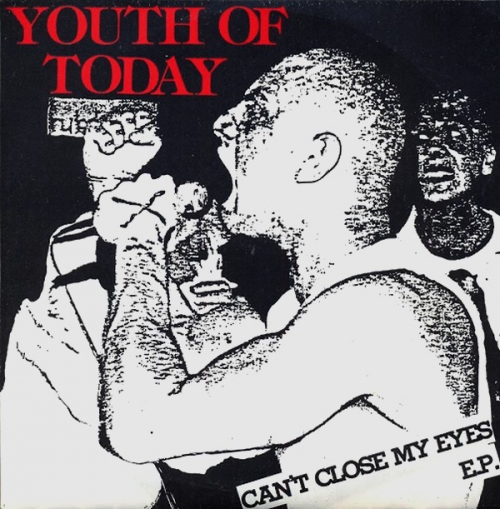
What were the circumstances behind you and Warzone parting ways?
[Murphy's Law singer] Jimmy [Dresher] was always one of my good friends. I met him when I was 12 outside of Great Gildersleeves when Murphy's Law played with Void, and I think Youth Brigade. It was the show where the singer, John [Weiffenbach], blew his knee out. They only got to play "Time to Die" and "Who Are You?" and that was it. I was such a Void fan at the time. They were so fucking heavy! Anyway, I met Jimmy at that show. Years later, I was only 15, but I was working at the [NYC bar and music venue] Pyramid as a bar back [laughs]. Ray and Jimmy were working the door.
So, Murphy's Law had put out their first record and then got the Beastie Boys tour. They decided they wanted to add a second guitarist to the lineup and asked me. I was hanging out with Jimmy one night and he was like, "Man, you should just do it!" I didn't want to fuck Ray over and quit Warzone. I was living with my first wife at the time, Kate, you know, from [NYC vegetarian restaraunt] Kate's Joint. She was like, "Are you fucking kidding me? You're never gonna get an opportunity like this again!" So I ended up quitting Warzone and joining Murphy's Law.
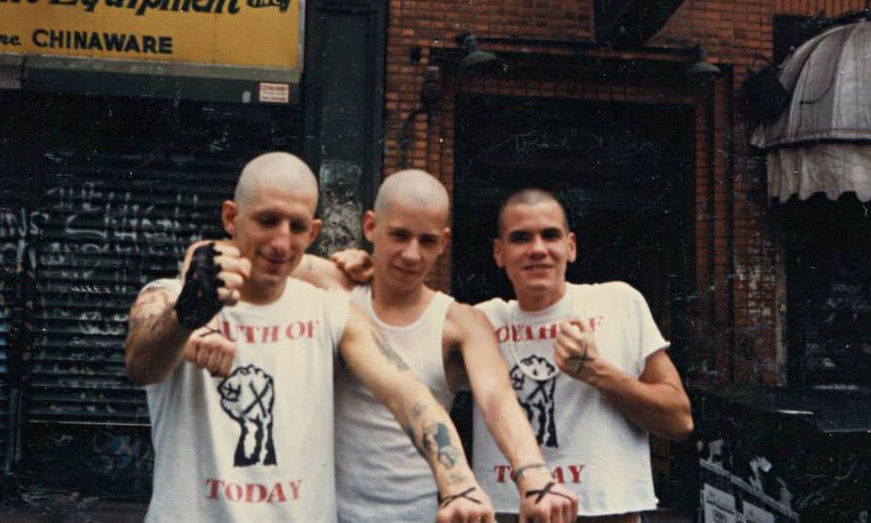
How did Raybeez take the news of you leaving Warzone?
Man, was there fucking schism! Ray was pissed, dude! I was the main songwriter in Warzone. A lot of people don't know that. I think with the Revelation Records reissues, they included the songwriter credits. I wrote the words and music to "As One" when I was 15. "In the Mirror" I wrote when I was 14, you know? "Dance Hard or Die" I wrote when I was 13, words and music. Those songs were influenced by me listening to Youth of Today, blatantly. But yeah, Ray was pissed. He eventually got over it.
SEE ALSO: Interview Timmy Chunks (Token Entry, Let Rage!)
So the next move was the Beastie Boys tour with Murphy's Law. That was your first tour, right?
Exactly. It was Murphy's Law, Fishbone, and then Beastie Boys. 56 shows across America. Beastie Boys were the #1 band in the country. I'm 16 and we're fucking playing arenas! I was playing in Murphy's Law and on the License to Ill tour... it was on, man! After that tour, we had fired the bassist, Pete [Martinez], so I switched to bass, which I've always loved playing anyway. We did a little run like that and then Uncle Al quit the band, so I went back to guitar.
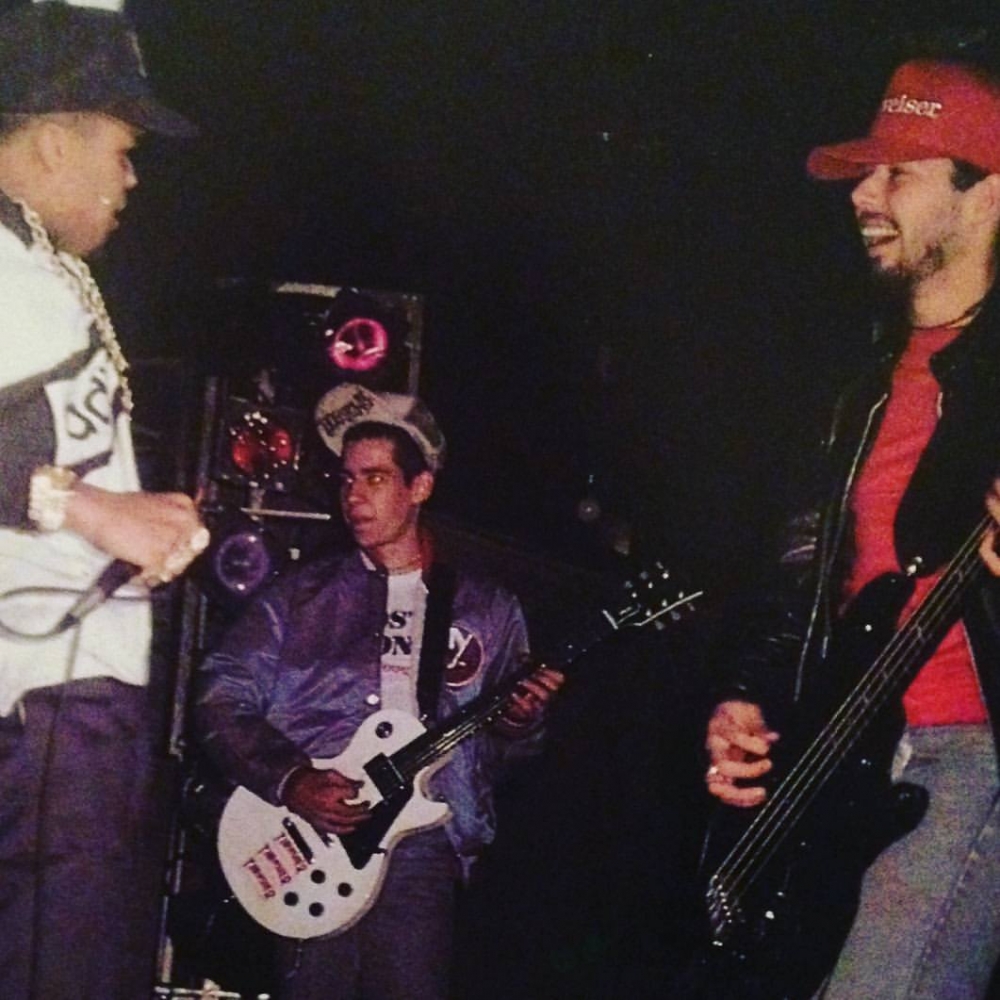
That's when you got the late great Chuck Valle on bass.
Yeah, we had auditioned Chuck Valle (Ludichrist, Dripping Goss) and Craig Setari (Sick of it All, Straight Ahead, Agnostic Front). I think AF might have auditioned Chuck as well. But I remember there being some kind of discussion between Jimmy and Stigma about who would get who in their band. It was like a baseball trade [laughs].
The first Murphy's Law album you appear on is the second one, Back with a Bong.
At that point, we were always on the road. Somewhere in there we made Back with a Bong. Then we did more touring. We went out with the Ramones, the Dickies, Red Hot Chili Peppers... we would go out on our own. We just worked really hard. I'm 17-18-years old and we're playing the Ritz in NYC, selling it out. Granted, I would leave with only $100 in my pocket [laughs]. "Oh, we owe the promoter this much, and this person this much..." I was just happy to be out on tour and playing music. We did the "Panty Raid" video. "Oh shit! I'm on MTV!" It was all happening.
Anyway, we go up to Woodstock, NY to make Back with a Bong, and I didn't even have a good guitar at that point [laughs]. Once again, Doc and Darryl [Jenifer of Bad Brains] once again help us out and let me use their shit. Doc also showed me how to play reggae during that record. I'm still learning from Doc, on so many levels. But back to that time period, I don't think any of us in the band thought of Murphy's Law becoming a career or anything. Maybe if we did, we would have made different moves and who knows what would have happened?
What happened for the next Murphy's Law album, The Best of Times?
In 1990, we left Profile Records and then Relativity Records offered us a deal. They gave us a boatload of money, and we didn't even have to give them any demos. We were kind of a happening band and crossed over to the whole college thing. When it came time to make the album, we had no songs written for it. We came out here to LA and worked with [John] Norwood [Fisher] and [Philip] "Fish" [Fisher] because we had toured with them on the Beastie tour. They also did the horns on Back with a Bong, so we were super-tight with them. Norwood and "Fish" had just produced that Chili Peppers song, "Taste the Pain," so we were like, "Oh! Let's just have them produce our album!"
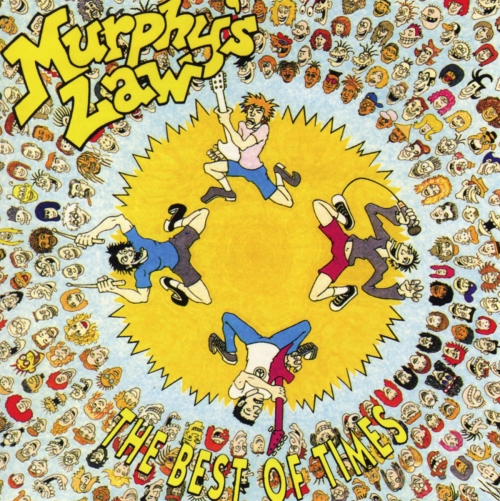
So it sounds like you guys went for the whole big-budget, LA recording experience. Without any material ready, how did you manage to finally make The Best of Times?
I turned 21 when we were making that record. But yeah, we didn't have any songs written. We went into this giant recording studio and I was renting 1959 sunburst Les Pauls ...we just went nuts! [Laughs] We would just jam and record everything. That's why you ended up with the record we ended up with. It just wasn't very good. But once we were done, we went back out on tour. We took the Mighty Mighty Bosstones out on their first tour. At some point, I left Murphy's Law for a minute and then me and [Cro-Mags singer] John [Joseph] started the original version of Both Worlds. We did a couple of gigs but it wasn't happening. It was very Living Colour wannabe kind of shit. I ended going back to Murphy's Law and toured a lot more.
That takes us to the next phase of your Murphy's Law story. Tell me about how thee murder of Chuck Valle affected you.
Yeah, Chuck [Valle] had left the band and we were on tour somewhere on the East Coast when we got the call that he had been murdered. It wasn't like there had been any bad blood. Everyone was still friends with each other. Chuck was one of my best buddies. So his death really fucked me up for a long time. I know it fucked Jimmy up, too. I knew people who had died. "Oh, this guy overdosed..." You know what I mean? But the way Chuck died was so senseless. It was terrible.
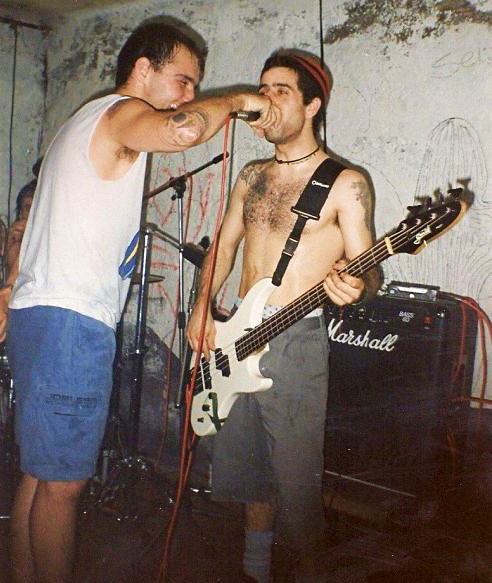
The next Murphy's Law album you played on was 1996's Dedicated.
Right. That's probably my favorite Murphy's Law record. I think people sleep on that record. There's some great songs on it. We toured a lot during that time. I remember taking out H2O. We hit Japan and Europe again, just a lot of touring. Anyway, it just wasn't going anywhere and I ended up quitting. I didn't even want to play music at that point. I wanted to just concentrate on the restaurant. Well, that lasted like two minutes [laughs].
Just so I don't mess up the timeline, what was the next band you played in after Murphy's Law?
Me and [bassist] Dean Rispler had been in Murphy's Law together, but he had quit before I did. We started a band called the Homewreckers. During that time, I had been listening to a lot of Heartbreakers, Stooges, New York Dolls, MC5... that kind of stuff. I think that's when my guitar playing got a lot better. So, the Homewreckers was like a proto-punk kind of band. We only did a couple of gigs and put out a 7" that only 300 copies exist of. The label that did it [007 Records] was run by this guy Chris who worked at the World Trade Center. Well, when 9/11 happened, all the records were destroyed because he used his office as the storage space for his records. I don't even have a copy of that record.
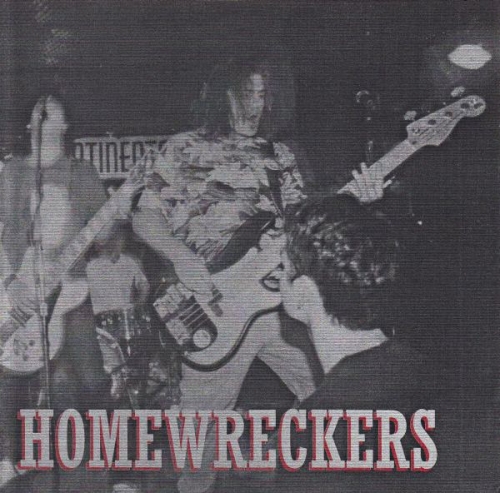
The next band after that was D Generation. How did you end up joining them?
One day I'm at Kate's Joint and Jesse Malin and Danny Sage came in. At that point, D Gen were huge in NYC. They had gotten a million dollar record deal and all that. Anyway, they told me that they needed a guitar player and asked if I was interested. "We're going on tour with Green Day." I was in. So I joined and we went on a 10-week tour. It's funny, but my whole musical career can be traced back to hardcore. Like Jesse from D Gen, he was in Heart Attack. Then there I was on tour and [Token Entry singer] Timmy Chunks is also there because he was a guitar tech for Green Day at the time.
How do you feel about the D Generation album you appear on, Through the Darkness?
I thought I was joining the New York Dolls, or some shit, but it ended up that I had joined the Counting Crows [laughs]. Jesse was definitely going more for a singer-songwriter thing at that point. I just don't think that record I did with them is very good. The label wasn't into it. I actually bailed before the record even came out.
Chrome Locust was your next band.
Yeah, I started that with Michael [Wildwood], the drummer from D Generation. That was like Black Sabbath meets the Bad Brains. We were a trio and I sang. Actually, the Bad Brains took us out on tour when they were called Soul Brains. This guy, Steve Sinclair, had a label called MIA Records we were working with. Then Atlantic Records wanted to sign the band and they offered us something like 75K-100K, but Steve wanted 250K to release us. It was ridiculous. All in the same week, I got asked asked to audition for the Foo Fighters or join Danzig.
How did you get on the Foo Fighters' radar?
I'm not even sure. I know that Gus, their tour manager guy, got in touch with me. I'm standing outside my restaurant and I'm talking with [SideOneDummy Records owner, singer of Wax and 22 Jacks] Joe Sib and Chris Shiflett, who is now the guitarist in the Foo Fighters. This guy Trevor who works at VICE comes up to me and says that the tour manager from the Foo Fighters wanted to get in touch with me and see if I wanted to audition. I had just got offered the Danzig gig... no audition necessary. I had known Glenn Danzig from the Misfits days, and the drummer at the time was Joey Castillo, who I had known forever.
At that point, my marriage was over. The D Gen thing didn't work out. It was a heavy period. So I thought to myself: "Will I have more fun in the Foo Fighters or Danzig?" Cause it was never about money for me. It's funny because Chris Shiflett was standing there with me when I found out about the Foo Fighters thing and he ran to a payphone and got himself an audition [laughs]. After I joined Danzig, both bands rehearsed at this place in the [San Fernando] Valley called Mate's and I see Chris and he's wearing this Western kind of shirt and real clean cut kind of clothes, and here I was dressed all in black. We just looked at each other and thought, "Yeah, we both got the right gig." [Laughs] It's all good.
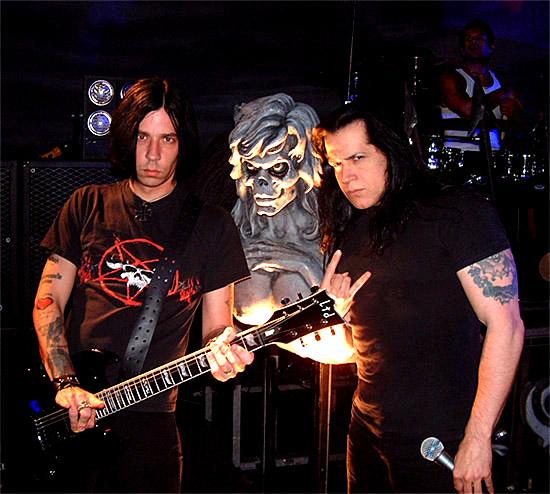
What was the Danzig experience like for you?
I had a lot of fun. I also ended up playing in Samhain. I was doing double-duty in Danzig and the Samhain reunion tour. Most people didn't even know it was me because I would be covered in blood and do the whole Devil Lock thing on my hair and then take a shower after our set. [Laughs] Then I would come back and do the Danzig set. That's when I moved to Los Angeles.
You made the Danzig 777: I Luciferi album when you were a member of the band.
I wanted to make that shit sound like Danzig, and I think we did that. In my opinion, it's the closest he's gotten to classic Danzig since the original band. I think it's a good record. The production was good. I brought the engineer in to the album, who ended up being Nick Raskulinecz, a guy that has gone on to do stuff like Rush and Foo Fighters. He was just starting out at that time.
Around that time, you started Son of Sam, a very Misfits/Samhain-like project.
It's funny, but I hated the Misfits when I was a kid. I couldn't stand the whole Jersey jock thing. I fucking hated them. Jimmy from Murphy's Law loved them, but I was never a fan. He used to always play them in the van and torture me [laughs]. But yeah, I loved Samhain. After that first Danzig tour, me and [Samhain drummer] London May started jamming and writing songs that were very Samhain-esque-sounding. We figured we'd do a 7" because I have always loved doing fun projects like that. Those kinds of projects are like great one-night stands where you get to have this amazing sex without all of the fucking drama of a relationship [laughs]. Anyway, on the Samhain tour, AFI had come out on some dates, so we asked [AFI singer] Davey [Havok] to do the vocals. Davey then brought up the idea of [The Offspring singer Dexter Holland's label] Nitro Records putting it out. He was totally into it, so we then figured we should do a full-length album instead.
That ended up becoming the Songs from the Earth album.
This was kind of pre-ProTools, so London and I would work on songs and then mail cassettes to Davey up in Berkeley, CA. That's how that album was written. Until we went into the studio to record the album, I had no idea what he was going to be singing on those songs. A lot of people really like that album. Glenn plays keyboards and some guitar on the record, although he's not credited under his real name.
SEE ALSO: Burn’s Gavin Van Vlack on His Rough Teen Years, Graffiti, NYHC, Being Latino + More
How did you go from Danzig to your next band, Chelsea Smiles?
I had some downtime from Danzig and a buddy of mine owned that studio I mentioned before, Mate's. You would have Motörhead rehearsing in one room. Def Leppard would be in the other room. That kind of scene. I met David Bowie there one day. So the owner calls me one day and says that someone cancelled that weekend and if I wanted to come use the room and jam. So I called some friends, including Howie Pyro, who I knew from playing in Danzig. We ended up writing 5 songs right away. It was a very garage rock kind of thing. The next weekend, another band cancelled, so we got the room again. All of a sudden, the door of the room opens up and it's Joe Elliott and Phil Collen from Def Leppard [laughs]. Joe goes, "Man, you guys were fucking brilliant!" Then he goes, "Andrew WK just pulled out of our tour and we want you guys to do it!"
Did you guys end up doing the Def Leppard tour?
Well, I had a European tour with Danzig coming up and I forget about the Def Leppard thing. The owner of Mate's ends up getting in touch with me when I was in Europe and tells me that [legendary managers] Cliff Burnstein and Peter Mensch are trying to get in touch with me. "They won't leave me alone. They want to know who this baby band is that Def Leppard wanted to take on tour," he says. I was like, "Fuck! We don't even have a name!" We had rehearsed twice and had 5 songs! My friend wanted to know what he should tell Cliff and Peter, so being a wiseass, I told him to tell them: "I don't want to play to 50-year-old rock guys wearing 30-year-old rock t-shirts!" [Laughs] Peter Mensch calls him and my friend tells him what I said. I come home from that Danzig tour and my friend says, "Dude, every fucking record company, music attorney, and manager in LA is calling me to find out who this band is that told Peter Mensch to go fuck himself!" [Laughs] I was like, "Get out of here!"
I love that story! Peter and Cliff have managed bands like Metallica, Muse, and Red Hot Chili Peppers, so that's amazing that you told him that.
[Laughs] I know! But we didn't know what to do, so my friend suggested setting up some showcases, so we did that. All these label guys came down and this one dude from Capitol Records meets us and says that it sounds like the Dictators meets the Stooges. I was like, "This guy knows who the Dictators are?" [Laughs] I couldn't believe it, but it turned out he knew his shit. We ended up getting a deal with Capitol with just 5 songs and no band name yet. That kind of shit only happens in Hollywood... and it did. It ended up being one of the biggest nightmares of my life.
Really? What happened?
Capitol was like, "Make the record with this guy... oh, we don't hear a single." At the end of the day I'm 750K in debt to Capitol. But I got [legendary Beatles collaborator] Billy Preston to play keys on it. Ian McLagan from The Faces is also on it. But the A&R guy [Julian Raymond] ended up leaving Capitol, so that's how I ended getting a lot of work as a session guitarist because he started producing a lot.
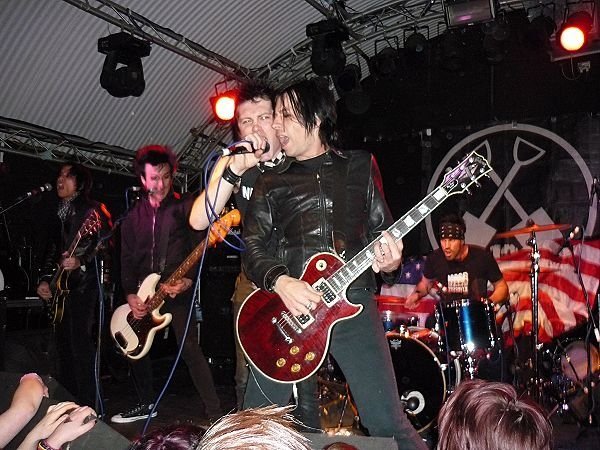
I think it's so cool that you got into that session world. I know it's really tough to crack that.
I don't remember if it was Cheap Trick or Glen Campbell that I ended up doing first, but Julian called me for it. I think it was Glen Campbell. Julian knew I was a gear nerd and he goes, "It has to sound like 'Galveston" or 'Wichita' [Lineman]." I told him, "That's easy, I'll get a Danelectro baritone guitar for tone with a bunch of tremelo." So I go in to do the session, and I was only supposed to play on one song and ended up being on most of the record. That was the Meet Glen Campbell album. Then they asked to be in the band for the TV promo stuff for the album. I did The Tonight Show and Jimmy Kimmel Live! during that time.
How did you go joining Glen Campbell's touring band? That must have been surreal.
Well, they told me he had a UK tour booked but Danzig was going to go out and do a Halloween run of dates. I got offered to do that, but the Glen Campbell tour had stuff like a performance with the BBC Symphony, Royal Festival Hall, rehearse at Abbey Road... all of these amazing things. So it was between that and going out with Danzig and playing "Mother" again. You know what I mean? The money was kind of the same, so it was a matter of did I want to go out on the big rock show with the wall of Marshall amps behind me, or do I go out with Glen Campbell and do something challenging and different? It ended up that Glen Campbell was the most punk rock motherfucker I ever worked with [laughs]. The stories that guy I had? Punk dudes have nothing on those country guys!
So, you're playing with Glen Campbell and doing the whole session guitarist thing.
Yeah, all these producers started calling me and I became the go-to guy for punk and rock records. A lot of stuff didn't end up coming out, but that's how it goes with these major labels. There are a lot of records that I played on that I can't say. Cheap Trick was one I wasn't supposed to get credit for. I played on The Latest album. What happened was I played on a track with them for a Transformers soundtrack ["Transformers (The Fallen Remix)"]. But yeah, someone at the label fucked up and put "additional guitars by Todd Youth" when The Latest album came out. [Cheap Trick guitarist] Rick [Neilsen] was pissed, dude! It was some cloak and dagger shit. I would show up to the studio 10 minutes after they were gone. It was calling the front desk of the studio and saying, "If anyone from Cheap Trick shows up..." That kind of thing.
But it ended up being cool with Rick later on because you worked with Cheap Trick after that, right?
Yeah, we re-cut "Dream Police" for an Audio commercial. Sony wanted like a quarter million to license the song, so we just did another version of the song as "Green Police." It was [Cheap Trick drummer] Bun E.'s [Carlos] last session with the band. It was me, Bun E., [Cheap Trick bassist] Tom [Petersson], and [Cheap Trick vocalist] Robin [Zander] on the session. Rick showed up to the studio and I was like, "Fuck, I'm off the session!" But Rick was like, "Since you're going to play on everything, let me at least show you how to play it properly because everyone messes up the middle section." I remember him saying, "You're making $1500 today, I'm making 150K." [Laughs] I was like, "Yeah, you got me there!" But yeah, I ended up doing the Sgt. Pepper Live album with them in Vegas. They took good care of me. They gave me a lot of work.
That takes us back to KISS, because your next gig was playing in Ace Frehley's band.
Yeah, Cheap Trick wanted me to do this Austin City Limits thing but that's when I got the call about the Ace thing. So yeah, it was full circle to when I was a little kid and loving KISS. The offer was to go to Australia with Ace. I couldn't believe it. Ace calls me up and says [doing an Ace impression], "Hey man, I just want to meet up and talk..." My audition was meeting up with him at Barney's Beanery in Hollywood to have dinner. Next thing you know, I'm on a plane with Ace going to Australia. Look, to me Ace is so punk rock. He's like an uptown Johnny Thunders. As a player he's punk rock as a motherfucker. The guy drove a Delorian down the wrong way of the Bronx River Parkway! Come on, man! He just doesn't give a shit. I did a bunch of touring with him. At the same time, I started playing in Jesse Malin's band. Again, going back to the whole hardcore connection.
What's the story behind you joining Motörhead in 2003?
I had become really close with the guys in Motörhead because we would always rehearse next to each other. There were times when Phil [Campbell] wouldn't be there, so they would invite me to jam with them. One time, Phil tells me, "Can you come play bass? Lemmy is at the dentist and he hasn't been at a dentist since 1967!" So I got to play Lem's bass. So, they knew I knew all of their songs. "Fast" Eddie [Clarke] was a huge influence for me. When you listen to my soloing, it's "Fast" Eddie. OK, so it's a Friday morning and I get a call from Todd Singerman, Motörhead's manager, and he tells me that Phil Campbell's mother had died and he had to go back to Wales for the funeral. They had some shows still booked, so he asked me if I would be able to finish the tour with them.
Had you been a big Motörhead fan growing up?
Definitely. I remember lying back with headphones on when I was kid, listening to No Sleep 'til Hammersmith, staring at that cover with the Marshall stacks and the lights for fucking hours! It was like, "This is what I want!" I'll give Harley Flanagan credit for turning me on to Motörhead and teaching me that Lemmy kind of bounce on bass. It was very rythmic and percussive. But I got the call on a Friday and I figured I'd have till the week after to learn the setlist, but Todd goes, "I need you on a plane on Sunday morning at 6AM. You have to do your first show that night." [Laughs] It was crazy, but I sat in front of my computer for hours that weekend learning the songs. I remember getting to the venue and saying hi to everyone. Lemmy then asks, "What 2 songs do you need the most work on?" So I tell him and we run through the songs and then he goes, "You're fine," and then walks off the stage! [Laughs] But you know what, I ended up killing it and the fans were great.
My last show with Motörhead was at the Stone Pony in Jersey and Jimmy from Murphy's Law and all these other NYHC people were there but they had no idea that I was playing in the band! Jimmy was like, "I couldn't fucking believe it! I looked up and it was Todd Youth playing guitar with Motörhead!" [Laughs] Anyway, that ended up being a huge highlight in my career, or whatever you want to call it. If it all ends right now, I played in Motörhead, know what I mean?
After that, you started working with John Joseph again, this time in Bloodclot.
I got a call from John again telling me that the Cro-Mags had a festival show booked and [Cro-Mags guitarist] AJ [Novello] couldn't do it because his mom had just died. So I played the show and John and I got to talking. He thought it might be cool if we wrote some songs for Cro-Mags together. I sent him a few ideas, but I then I went, "You know, John, I'm not really interested in writing Cro-Mags songs. Let's do something new." I told him that if Cro-Mags released a new record, I would be the first to go buy it, but I wanted to do something new with him.
That makes sense, start something fresh.
John then ended up coming out to LA for an Iron Man thing, but he blew his leg out and was stuck here. We then demoed 3 songs and it ended sounding really good. Then I said we should get [drummer] Joey [Castillo] and make it an all-star thing. You know, kind of like the band OFF! Then these labels started offering us deals... Century Media... this one and that one. Brian Slagel from Metal Blade came in and gave us a good deal. I think the album we made is great. John sounds incredible on it.
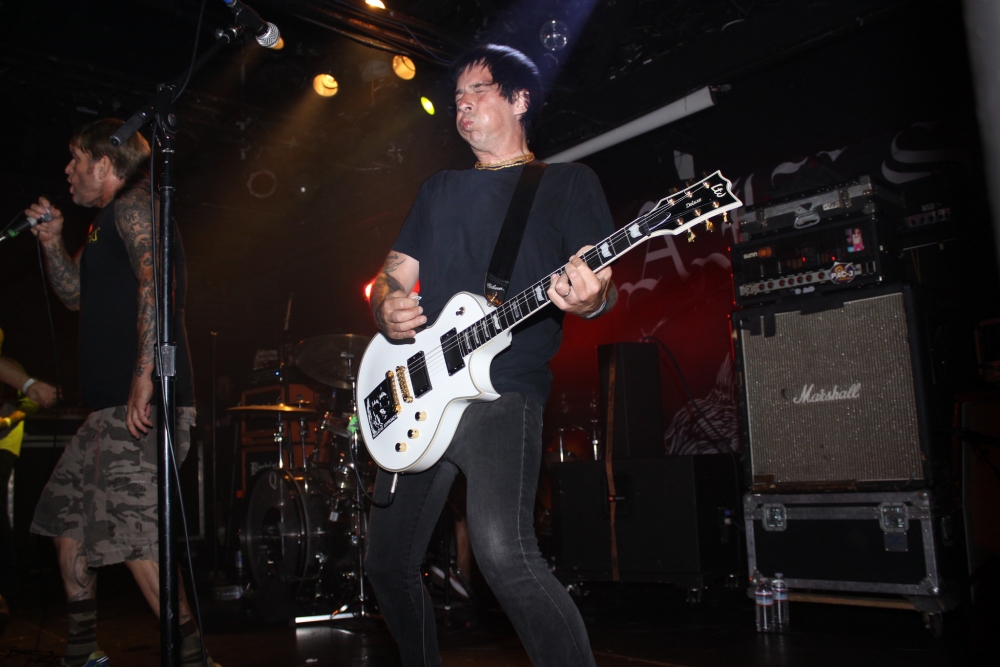
Finally, we get to FireBurn, your current band.
Well, everyone else from Bloodclot was busy playing in other bands, so I wanted to put something together with my friends for fun. Bloodclot had played The Power of the Riff festival in LA, and Nails was the headliner on the second night. I'm a big fan of Nails, so I went to see them and [Nails guitarist/vocalist] Todd [Jones] is getting ready to go on stage when he sees me and goes, "Hey man, you're Todd Youth, right? Can we hang out after the show tonight and talk about hardcore and Warzone? [Laughs] I was like, "Fuck yeah, man!" We ended up going to lunch another day and brought up the idea of jamming together. So, he says he knows the perfect drummer, and that ends up being Nick [Townsend].
The three of us started playing and we could have gone in two different directions. I'll play you some of those early demos, but we had some straight-up AF/Negative Approach kind of stuff. And then there was the Bad Brains-y, Cro-Mags kind of stuff. We then tried to figure out who we should ask to sing. Ryan [George] from Carry On came up because he and Todd had played together before. But I had run into [Ras] Israel [Joseph I] at an art thing that Daryl from the Bad Brains had done here in LA. I thought to myself, he's living out here now and I was always a big fan of that Rise album he did with them. I reached out to him and he came to the studio to jam and the first two songs we wrote together were "Break It Down" and "Suspect."
Not kissing ass here, but I think FireBurn is one of the best bands to come out of the hardcore scene in a long time.
Thanks, man. I remember Todd was out on tour with Nails in Europe and I sent him the demos and he was like, "Holy fuck!" We recorded the Don't Stop the Youth EP right before I was going out on tour with Bloodclot to open for Negative Approach. The tour ended and FireBurn booked some shows around town. We just dropped the EP out of nowhere and it caught on. People really responded. That first week we played our first show at Vacation Vinyl.
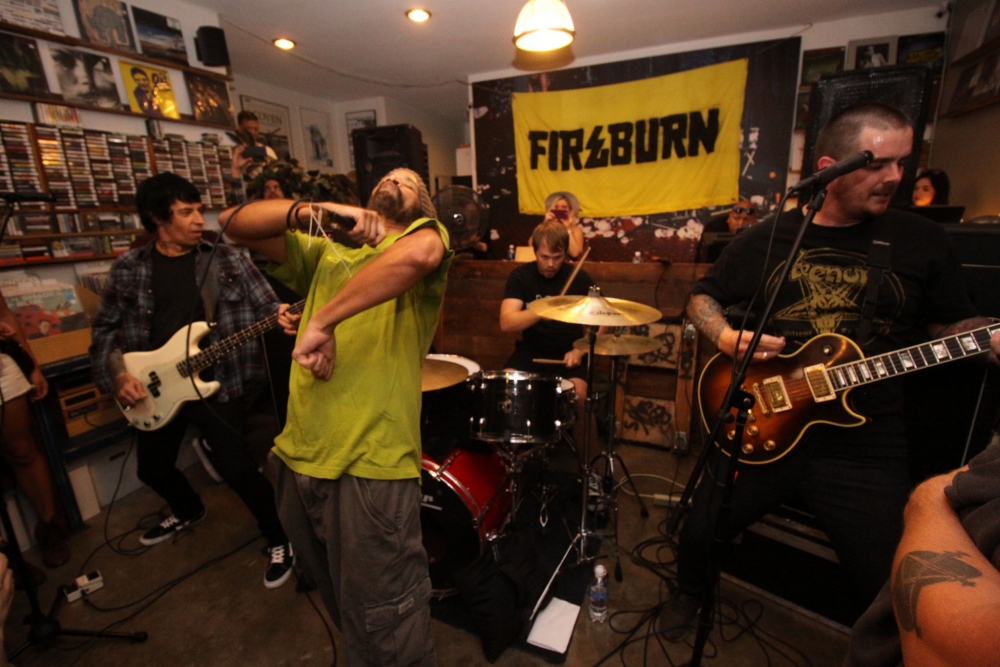
Yeah, I know basing it on the response to anything FireBurn-related on No Echo, people are very excited about the band.
No bullshit, dude. This isn't just something I'm going to say because I'm being interviewed, but I've never been so fucking happy and proud of a band I'm doing, and I've obviously played in a lot of bands in my life. I am so excited with what we're doing with FireBurn.
You have a new guitarist in the band.
Yeah, Todd is just focusing on Nails, so we got Eddie [Oropeza] now and the dude smokes me on the guitar. He puts the biggest smile on my face when he rips a lead.
It sounds like FireBurn is in it for the long haul.
We're having a great time and there's no pressure. Everything we've set out to do so far we've done. We're going to go out with GBH and we're psyched. Everything with this band has been effortless and organic. We get off being together and playing together. I haven't felt this kind of energy in a really long time.
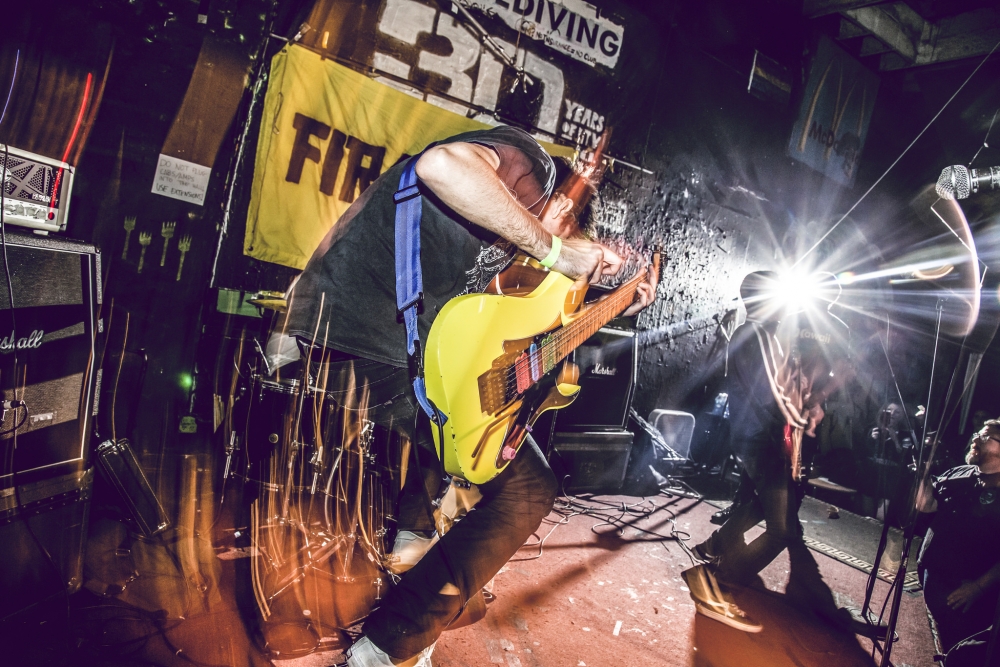
***
FireBurn's two releases are available from Closed Casked Activities, and the band is on Facebook and Instagram.
Tagged: agnostic front, bloodclot, danzig, fireburn, motorhead, murphys law, todd youth, warzone

